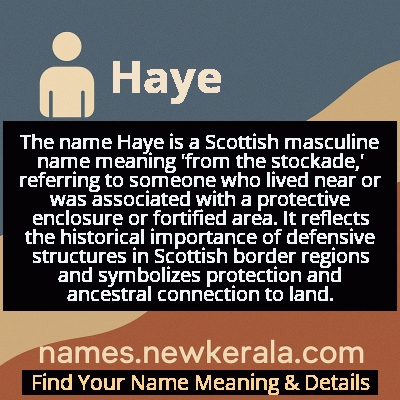Haye Name Meaning & Details
Origin, Popularity, Numerology Analysis & Name Meaning of Haye
Discover the origin, meaning, and cultural significance of the name HAYE. Delve into its historical roots and explore the lasting impact it has had on communities and traditions.
Name
Haye
Gender
Male
Origin
Scottish
Lucky Number
3
Meaning of the Name - Haye
The name Haye is a Scottish masculine name meaning 'from the stockade,' referring to someone who lived near or was associated with a protective enclosure or fortified area. It reflects the historical importance of defensive structures in Scottish border regions and symbolizes protection and ancestral connection to land.
Haye - Complete Numerology Analysis
Your Numerology Number
Based on Pythagorean Numerology System
Ruling Planet
Jupiter
Positive Nature
Optimistic, inspirational, and creative.
Negative Traits
Scattered, exaggerating.
Lucky Colours
Yellow, gold, purple.
Lucky Days
Thursday.
Lucky Stones
Yellow sapphire.
Harmony Numbers
1, 2, 9.
Best Suited Professions
Arts, writing, communication.
What People Like About You
Creativity, optimism.
Famous People Named Haye
Sir Gilbert Haye
Knight and Author
Translated French chivalric works into Scots and served as Chamberlain to Charles VII of France
Alexander Haye
Clan Chief
Chief of Clan Hay during the Scottish Reformation period, maintaining clan lands and influence
John Haye
Military Commander
Fought in the Thirty Years' War and served under Gustavus Adolphus of Sweden
William Haye
Architect
Designed several notable country houses in the Scottish Borders region
Name Variations & International Equivalents
Click on blue names to explore their detailed meanings. Gray names with will be available soon.
Cultural & Historical Significance
Throughout Scottish history, individuals bearing the name Haye have played crucial roles in military conflicts, political developments, and cultural preservation, making it a name that embodies Scottish resilience and aristocratic heritage. The name's connection to physical enclosures and stockades also reflects the turbulent history of the Scottish borders, where defensive structures were essential for survival. This historical context gives the name layers of meaning related to protection, territory, and the establishment of safe communities in challenging environments.
Extended Personality Analysis
Individuals named Haye are often perceived as possessing strong protective instincts and a deep sense of responsibility, reflecting the name's origin meaning 'from the stockade.' They tend to be practical, grounded people who value security and stability in their personal and professional lives. Historically associated with land ownership and clan leadership, those named Haye often demonstrate natural leadership qualities, strategic thinking, and a commitment to preserving traditions. Their personality typically combines Scottish pragmatism with a strong sense of loyalty to family and community.
While they may appear reserved initially, they reveal deep emotional connections and steadfast reliability once trust is established. The name suggests someone who builds strong foundations in relationships and endeavors, much like the protective enclosures from which the name derives. This personality profile reflects the historical role of the Hay family as guardians and stewards of their lands and people. The combination of protective nature and leadership qualities makes individuals with this name well-suited for roles that require both strategic planning and personal commitment to those under their care or influence.
Modern Usage & Popularity
In contemporary times, Haye remains primarily used as a surname rather than a given name, though it occasionally appears as a first name honoring family heritage. The name maintains strong connections to Scottish diaspora communities worldwide, particularly in Canada, the United States, Australia, and New Zealand. While not among the most popular Scottish surnames today, it continues to be recognized for its historical significance. Modern usage often involves genealogical research and clan associations, with many individuals named Haye actively participating in Scottish cultural events, Highland games, and clan gatherings. The name has seen a slight resurgence in interest due to growing popularity of unique heritage names and increased fascination with Scottish history and genealogy among younger generations seeking to reconnect with their ancestral roots.
Symbolic & Spiritual Meanings
Symbolically, Haye represents protection, boundaries, and ancestral strength. The 'stockade' or 'enclosure' meaning evokes images of safety, security, and the establishment of personal or communal space. It symbolizes the creation of safe havens and the protection of what one values most—family, tradition, and heritage. Metaphorically, the name suggests someone who builds strong foundations, establishes clear boundaries, and serves as a guardian of values and traditions. It carries connotations of resilience, much like the fortified enclosures that withstood challenges throughout Scottish history. The name also symbolizes connection to land and place, reflecting the deep Scottish attachment to ancestral territories and the enduring nature of family legacies across generations, while simultaneously representing the human need to create secure spaces in an uncertain world.

